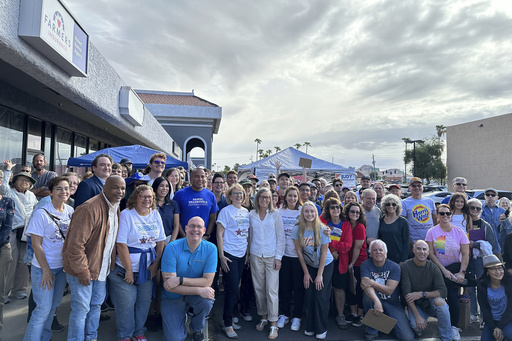
PHOENIX — Arizona Governor Katie Hobbs aimed for a significant shift in her state’s political landscape in the recent elections, hoping that her fellow Democrats would attain enough support to overturn the slim Republican control of the state Legislature. Such a change would have facilitated her policy initiatives ahead of her 2026 reelection bid.
However, the election results proved contrary to her expectations. Rather than diminishing their legislative foothold, Republicans managed to expand their majorities. Notably, some moderate Republicans who were inclined to collaborate with Hobbs on various issues were ousted not by Democrats, but by far-right conservative candidates during the GOP primaries.
This outcome suggests that the national trend favoring Republican candidates, which had benefited Donald Trump in his previous presidential campaign and enabled a Republican takeover of the Senate, also permeated Arizona’s political scene. Although Democrat Ruben Gallego narrowly clinched the state’s open U.S. Senate seat, Trump once again triumphed in Arizona, regaining the state four years after losing it to President Joe Biden.
GOP strategist Barrett Marson believes that with these Republican gains, Hobbs’ policy agenda will face considerable challenges. He remarked, “She may have to collaborate with the Republican Legislature more than she has in the past, making compromises on issues she might otherwise resist.” He emphasized that some bills could end up being signed by Hobbs simply because it might be politically advantageous for her reelection campaign.
Despite assurances from Hobbs’ team that she will strive to work across party lines as before, there are indications that this could present complicated hurdles for her initiatives surrounding reproductive rights, voting access, and addressing Arizona’s water issues.
Hobbs actively campaigned for a Democratic majority in the Legislature, with her political action committee surpassing its goal of raising $500,000 to support Democratic candidates through a series of events aimed at enhancing their visibility and support. She emphasized the importance of encouraging voters to complete their ballots to make a meaningful change.
One of Hobbs’ favored candidates, former educator and state representative Judy Schweibert, lost her bid for the state Senate seat to Republican Shawnna Bolick, who was appointed to fill that seat.
Looking ahead, Republicans are set to leverage their amplified majority to advance a conservative agenda focusing on issues like school choice and border security, according to newly elected House Speaker Steve Montenegro. He suggested that the recent GOP triumphs reflected a disconnect between Hobbs’ policies and the preferences of Arizona voters, promising to build upon the previous Republican administration’s achievements.
Thus far, Hobbs has faced substantial obstacles in promoting her Democratic agenda, with Republican lawmakers blocking her attempts to amend the expanding school voucher program during the most recent legislative session. Her efforts to reduce the program’s budget were only minimally realized with a cut of $2.5 million.
Montenegro remarked, “Despite spending tens of millions to sway elections, the Democrats were not successful. The voters of Arizona have rejected that approach.”
Democrats have criticized Montenegro for leaning even further right than his predecessor, Ben Toma. Toma previously supported a controversial ballot measure that would authorize local law enforcement to arrest individuals suspected of unlawfully entering from Mexico. While that proposal passed, its enforcement remains uncertain due to its reliance on similar legislative developments in Texas.
Strategist DJ Quinlan described Montenegro as a potential source of more confrontational bills heading Hobbs’ way, especially regarding social issues like reproductive rights and LGBTQ+ matters, which may be set up to be vetoed. The absence of moderate conservative voices, such as those represented by former state senator Ken Bennett, further complicates Hobbs’ prospects. Bennett reportedly aligned with Democrats to successfully oppose an anti-transgender measure before losing his primary to Mark Finchem, a staunch Trump ally.
With the Republican majority solidified, Hobbs may find it necessary to utilize executive orders to pursue her policy objectives. Quinlan suggested, “She will seek every available opportunity to promote her agenda, including making full use of her gubernatorial powers.”
Indeed, Hobbs has started to use her executive authority for her party’s agenda, recently moving towards the regulation of groundwater usage in parts of rural southeastern Arizona through the Arizona Department of Water Resources.
During her initial two years in office, Hobbs vetoed a substantial number of Republican-backed measures, including a proposal restricting schools from recognizing the preferred names and pronouns of transgender students and legislation shielding parents with concealed-carry permits from legal repercussions when bringing firearms into gun-free zones. Marson anticipates that Hobbs will continue to employ vetoes frequently during the upcoming legislative session.
A spokesperson for the national Democratic Legislative Campaign Committee, Sam Paisley, mentioned that the significant financial investments in the presidential race and contentious ballot issues made it difficult and costly for legislative candidates to gain visibility. She noted that Democratic voters tend to underperform in down-ballot races compared to their Republican counterparts.
